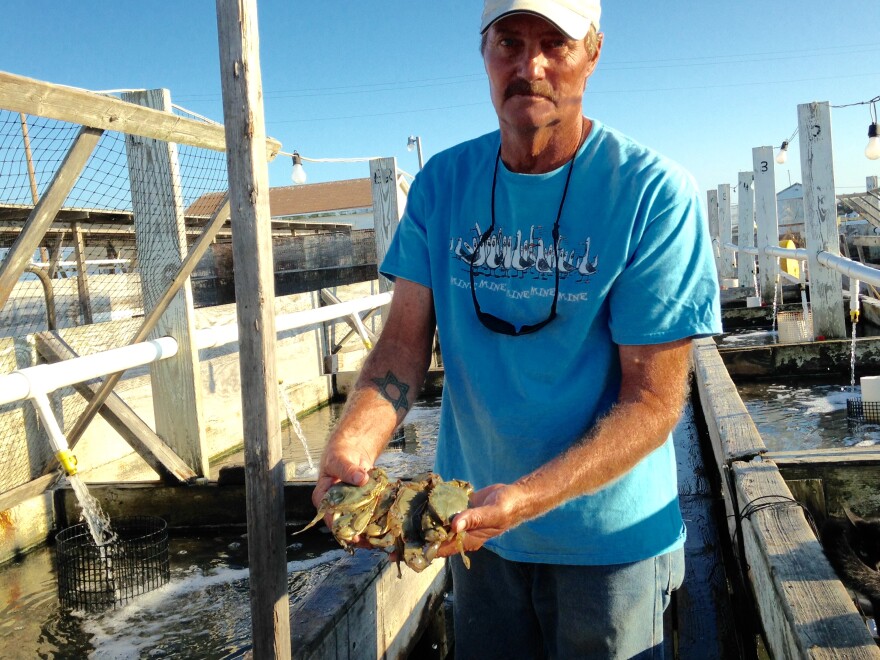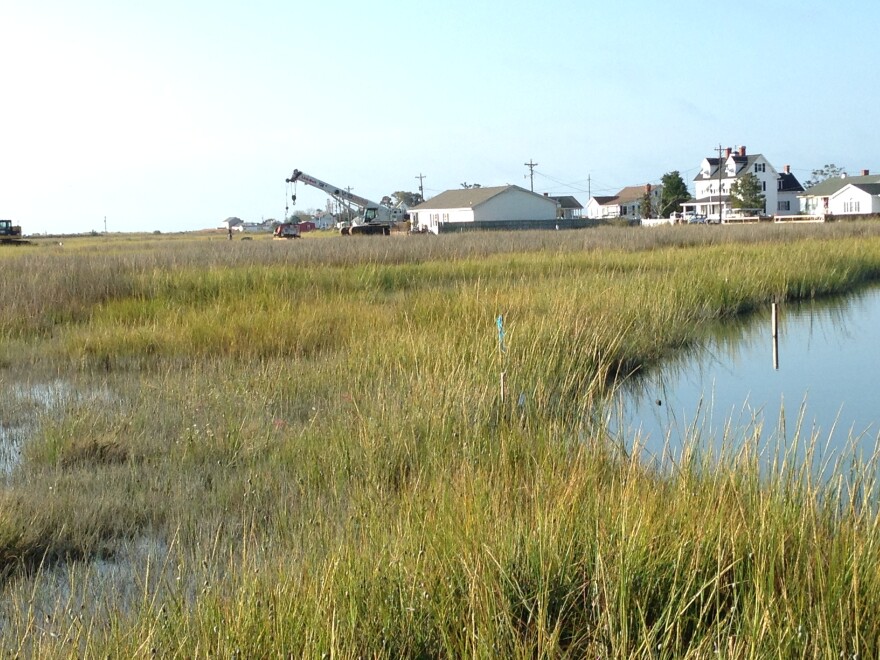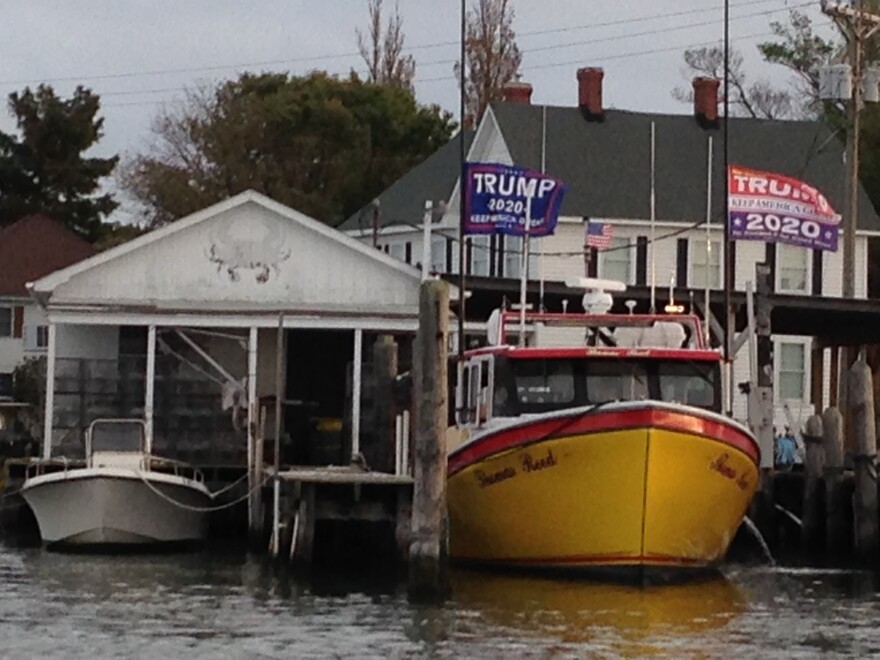As hurricane season draws to a close, Virginians who live on the coast may be feeling relief, but for residents of Tangier Island the threat of being overwhelmed by wind and waves remains. They could become the first climate change refugees in this country. This fall, the state promised to spend $3 million on a sea wall to protect Tangier’s harbor, but locals want a wall to surround their shrinking island.

60-year-old James “Oooker” Eskridge maneuvers his small boat toward a distant dock where local watermen have built small, wooden houses to protect their crab pots, refrigerators and freezers. Tangier is considered the soft crab capital of the world – its residents depending on blue crabs and oysters for more than 200 years. As we approach the dock, Eskridge is greeted by four cats he rescued as kittens.
" We were having a tropical system, and there was a tree stump in the storm with four kittens hanging onto it, so I went out and picked them up, and they’ve been here ever since. We’re a conservative group. It’s Sam Alito, John Roberts, Condi Rice and Ann Coulter," he says.

That’s right. Eskridge, who is the mayor of Tangier, named his cats for two conservative justices on the Supreme Court, a conservative TV commentator, and a former Secretary of State appointed by George W. Bush. Outside his house on the island he flies the American and Israeli flags, along with a third proclaiming his devotion to Donald Trump.
“He protects religious liberties. He’s a friend of Israel. Tangier is a huge supporter of Israel and the Jewish people. It’s Biblical. God said, ‘The Jews I will bless, and those who curse them I will curse,’ and that’s clear enough."
He spoke of his fondness for Trump during an interview with CNN. “What would you like to tell the president if you could?” a reporter asked. “Tell him I love him like family,” Eskridge replied. As it happened, Trump was watching, and he asked his staff to arrange a phone call with this ardent supporter.

"I was out crabbing at the time. It was a Monday morning, and my son and another guy came to me and said I needed to get home. The President wanted to talk to me, and I said, ‘president of what?’ They said, ‘President of the United States, Donald Trump, is going to give you a phone call.' I thought someone was joking!"
Eskridge headed home, and the call came that afternoon.
"A lady said, ‘I’m with the office of the president. President Trump would like to speak with you if it’s possible,’ and I said, ‘It is possible.’ So we chatted for 10 minutes or so – talked about sea level rise, climate change, which we’re on the same page with. We’re not on board with that."
Despite the fact that Tangier loses nine acres of land a year, Eskridge and many others on this island do not believe in sea level rise. They insist their problem is erosion.
"We can see the erosion going on. You can see it weekly, but the sea level rise, we just don’t see it happening," he explains.
What they do see is water – everywhere. At high tide it comes up through the sewers and ground, leaving many yards and streets flooded. Tourists can't understand why local residents aren't alarmed.
"They'll see the kids playing in the water on the streets, and it doesn't concern me, because I did the same thing when I was a boy. It's nothing new."
What is new is a determination to get government help in building a sea wall around Tangier. Eskridge discussed it with the president, who suggested officials should speed up a study of that idea. Since then, the mayor has met with the Secretary of the Interior and the head of Fish and Wildlife – two agencies that could provide funding for such a project. The Army Corps of Engineers is asking Congress for money to do a study, and the state has pledged to start work this year on a $3 million sea wall to protect Tangier harbor. In the mean time, residents are facing the prospect of losing their homes and their history, but few are ready to leave. We'll tell you why in our next report.

Part Two: Facing the Loss of Their Land
For more than 300 years, Americans have been living on Tangier Island in the Chesapeake Bay – catching blue crabs and oysters for cities on the East Coast. More than an hour by boat from the Eastern Shore, about 450 people live in relative isolation – without cell phones or shopping malls. They speak with an accent heard nowhere else in the world, get around by golf cart or bike, and many attend church not once but twice on Sundays. Now, those residents are facing a crisis – their island is disappearing.

The New Testament Church is one of two on the island, a place to find comfort and community. One by one, parishioners stand to ask for special prayers. Pray, they say, for a young man who’s been using drugs and now faces serious legal problems, for an elderly resident who recently fell, for another who is having chemotherapy, and for children who come from broken homes. Four elders in the church take turns preaching – among them a high school history teacher named Duane Crockett. He knows that two-thirds of the island has washed away since an ancestor of his settled here in 1686, but he’s not praying much for Tangier’s future.
"I believe we’re here as long as the Lord wants us to be here, and I truly believe he is going to provide for that," he explains.
He notes in the Bible that God promised Noah – no more devastating floods.
"After the rainbow had been placed in the sky. He said, ‘Never again will I destroy the Earth with a flood.’ Well, there’s the sea level rise being taken care of right there."

Jean Crockett, who says she’s not related to Duane, shares his passion for God and the Bible, but she’s not as certain about the island’s future. An English teacher at the high school, she’s heard scientists say sea levels are rising, the island is sinking and storms are more prevalent.
"You put them all three together – we’re subsiding, we’re eroding, and the water levels are rising, it doesn’t bode well for us," she concludes.
But she’s made no plans to leave.
" Who has the money to start all over again if you don’t have to?" she wonders. "Who’s going to come buy my house so that I can buy somebody else’s house? Nobody!"

And Duane Crockett argues that in the age of climate change there is no safe place to go.
"Are we supposed to move anywhere on the East Coast where they are saying that the sea levels are going to rise over the entire East Coast? Should we go down to the Gulf Coast or the southern part of the country where hurricanes strike with such a powerful force? Should we go to the Midwest where tornado alley is located and people lose entire communities in just a few minutes?"
The island’s mayor, James Ooker Eskridge, so named for his childhood imitation of a pet rooster, thinks Tangier is entitled to federal assistance.
"We’re not just talking about a piece of land. We’re talking about people, families, a community, a culture , a way of life. This is home to us, and of course we produce a lot of seafood – soft crabs, hard crabs, oysters, and also since WWI we’ve had a lot of folks serve in the military. They deemed us important people then, so I’m hoping we’re still important."
And Duane Crockett wants the feds to test ways of preventing erosion on Tangier.
"If you cannot save a community of 450 people, a 3-mile long island and a mile and half wide island, if you can’t save us, you’re wasting your time on large cities like New York, Boston, Norfolk and Philadelphia, because it’s not going to be done."

The solution he and many other island residents promote is a sea wall to surround Tangier. How would that work, and will the nation spend millions of dollars to save an island of fewer than 500 people? We’ll consider those questions in our next report.
Part Three: Can Tangier Be Saved?
Tangier is a small, marshy island in the Chesapeake Bay – 90 miles south of Washington, D.C.. Separated from the Eastern Shore by a one-hour boat trip, the place has retained bits of history going back more than 300 years. Residents have survived hurricanes and epidemics, but scientists say their homes – which sit no more than four feet above sea level – may soon be overwhelmed by water.

Tangier is a small island – less than 700 acres, most of them marsh. When Europeans first came here in the late 1600’s it was three times that size, and as fishermen began to export blue crabs and oysters, the population grew to over a thousand people. But time and tide have taken a toll according to Duane Crockett, a high school history teacher and descendent of the island’s founder.
"I remember when I was a little boy, the western part of our island was washing away. There were some predictions being made that certain parts of our island would be gone within 5-10 years, and we finally got us a sea wall on the western side of our island which stopped the erosion 100% thank the Lord!"
The wall, built of stone, protected major investments including the island’s air strip, water and sewage treatment plants, but Jill Bieri – a marine biologist with the Nature Conservancy – isn’t sure a wall around the entire island would work.

“I’m not one to say that a wall will or will not protect it, but I don’t think in the long term that anything manmade can protect what’s going to happen naturally in these areas. Because we’re seeing more frequent storms, and we’re seeing higher storm surge and more flooding these erosion rates are increasing, and that’s what’s happening to the marshes all over the coastal United States.”
Local innkeepers Jim and Maureen Gott also have doubts. Referring to state plans for a $3 million sea wall or jetty to protect the habor, they say government can be slow.
"They’ve been studying the jetty for I think 18 years now. It’s good for us, because the Army Corps of Engineers comes here, stays with us for a couple of days, goes out and studies it, makes their report. It goes up through the channels. A couple of years later it comes back saying 'maybe.' By the time they come back, the land mass where they were going to put the jetty is no longer there."

Some Tangiermen are offended by those who say it’s not worth investing more money in a place that’s home to so few people, but Gott shrugs and appeals to those who love wildlife:
"This is a major stopping over point for migratory birds, for butterflies," he explains. "It’s a haven for small fish, for crabs, for oysters and clams. The loss of the island would be devastating to the wildlife and the ecosystem around here."
For now, he and his wife, who bought the Bayview Inn seven years ago, console themselves with increased business from tourists like Alex Shtogren and Allison Neplokh.
It's ground zero for change is what they’re saying, so I feel like it was kind of now or never," says Alex Shtogren.
"Just to think that this is a place with such history, going back hundreds of years, one of the really early settlements, and it might not be here in another decade or two," Allison Neplokh says
Also making their way to Tangier and, perhaps, making the case for its salvation, dozens of reporters from around the world.
This report, provided by Virginia Public Radio, was made possible with support from the Virginia Education Association.




